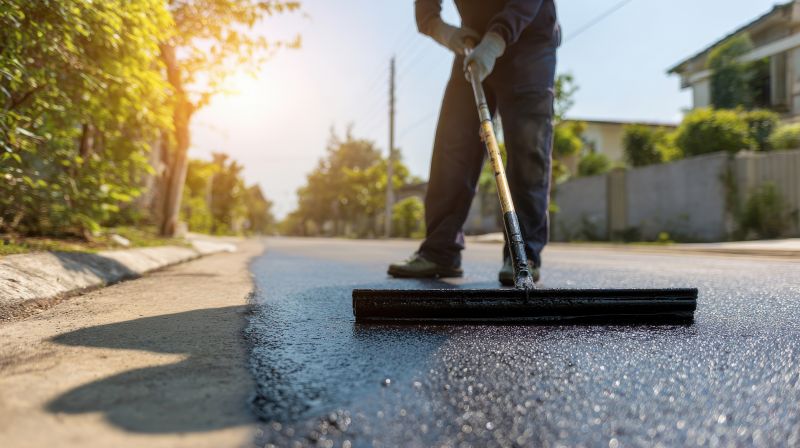Ultimate Asphalt Sealings Solutions To Enhance Pavement Longevity
Select from top-rated sealing products that provide durable protection and improve the overall performance of your asphalt.
 In Ankeny, IA, maintaining asphalt surfaces is essential for both residential and commercial properties. Proper asphalt sealing products can help protect pavements from the damaging effects of water, UV rays, and everyday wear and tear. Selecting the right sealing products involves understanding the different types of sealers available, their applications, and their compatibility with various asphalt surfaces. Whether for driveway maintenance or parking lot preservation, using quality sealants can extend the lifespan of asphalt and improve its appearance.
In Ankeny, IA, maintaining asphalt surfaces is essential for both residential and commercial properties. Proper asphalt sealing products can help protect pavements from the damaging effects of water, UV rays, and everyday wear and tear. Selecting the right sealing products involves understanding the different types of sealers available, their applications, and their compatibility with various asphalt surfaces. Whether for driveway maintenance or parking lot preservation, using quality sealants can extend the lifespan of asphalt and improve its appearance.
Top Overall Option
Premium Asphalt Sealer
A high-quality asphalt sealer designed to provide a durable and protective coating for various asphalt surfaces. Its formulation offers resistance to water, UV rays, and everyday wear, making it suitable for residential driveways and commercial parking lots. Easy to apply with proper surface preparation, this sealer helps maintain the appearance and integrity of asphalt over time.
Types of Products For Asphalt Sealings
Coal Tar-Based Sealers
Known for their durability and chemical resistance, ideal for high-traffic areas requiring long-lasting protection.
Asphalt-Based Sealers
Offer a natural appearance and are suitable for general residential and light commercial use.
Water-Based Sealers
Easier to clean up and often lower in VOCs, suitable for environmentally conscious applications.
Polymer-Modified Sealers
Enhanced with polymers for increased flexibility and adhesion, suitable for areas with temperature fluctuations.
Driveway Sealers
Specifically formulated for residential driveways, providing a protective and aesthetic finish.
Parking Lot Sealers
Designed for large commercial areas, offering high durability and resistance to traffic.
Crack Fill Sealers
Used to fill and seal cracks before applying a top coat, preventing water infiltration.
Emulsion Sealers
A blend of asphalt and water, offering easier application and quick drying times.
Silicone-Based Sealers
Provide excellent water repellency and flexibility for varied weather conditions.
Polyurethane Sealers
Offer a tough, durable layer ideal for high-traffic areas requiring maximum protection.
Bitumen Sealers
Traditional sealers that provide a strong protective coating suitable for heavy-duty applications.
Eco-Friendly Sealers
Formulated to produce fewer emissions and easier cleanup, suitable for environmentally sensitive projects.
Popular Choices
Commonly used for residential driveways, offering a protective layer and improved appearance.
Designed for extensive use in parking lots, providing durability against heavy traffic.
Popular for pre-sealing crack repair to prevent water damage and further cracking.
Favored for their ease of application and lower VOC emissions.
Chosen for their enhanced flexibility and adhesion properties.
Widely used for their quick drying and ease of use.
Popular for their toughness and resistance to chemicals.
Trusted for water repellency and weather resistance.
Selected for their high durability and protective qualities.
Often used in heavy-duty applications requiring robust protection.
Gaining popularity for environmentally conscious projects.
Asphalt sealers typically fall into two main categories: coal tar-based and asphalt-based sealers. Coal tar sealers are known for their durability and resistance to chemicals, making them suitable for high-traffic areas. Asphalt-based sealers, on the other hand, often provide a more natural look and are easier to apply. Additionally, there are water-based sealers that offer easier cleanup and lower VOC emissions, catering to those looking for a less hazardous option. When choosing a product, considerations such as surface type, climate conditions, and application method are important to ensure optimal results.
Applying the right sealer at the appropriate time can significantly enhance the longevity of asphalt surfaces. Proper surface preparation, including cleaning and repairing cracks, is crucial before sealing. Many products are designed for specific applications, such as driveway sealing or commercial lot maintenance, so understanding the product specifications helps in making an informed decision. Regular sealing, typically every 2-3 years, can help maintain the integrity and appearance of asphalt surfaces in Ankeny, IA, where seasonal weather fluctuations can impact pavement condition.
Investing in quality asphalt sealing products, tailored to your specific needs, can contribute to safer, more attractive pavements. Consulting with local suppliers or professionals can also provide insights into the most suitable products based on local climate and usage patterns. Remember, the goal is to select a product that offers reliable protection while fitting your budget and application preferences, ensuring long-lasting results for your asphalt surfaces.
Key Buying Considerations
- Determine the specific application, such as driveway or commercial lot sealing.
- Select the appropriate sealer type based on climate conditions and usage patterns.
- Consider the drying and curing time to plan application schedules accordingly.
- Evaluate the compatibility of the sealer with existing asphalt surfaces.
- Check for ease of application, including whether it can be applied with a brush, roller, or spray.
- Assess the level of UV resistance offered by the product to prevent surface degradation.
- Review the product's resistance to chemicals, oils, and water infiltration.
- Consider VOC content and cleanup requirements, especially for water-based options.
- Look into the product's flexibility and adhesion properties for areas prone to movement or temperature fluctuations.
- Estimate the coverage area per container to ensure sufficient quantity for the project.
- Review the manufacturer's instructions for surface preparation and application techniques.
- Determine if the product is suitable for crack filling or requires separate crack repair products.
- Evaluate the longevity and maintenance schedule recommended by the manufacturer.
- Ensure the product complies with local regulations and safety standards.
